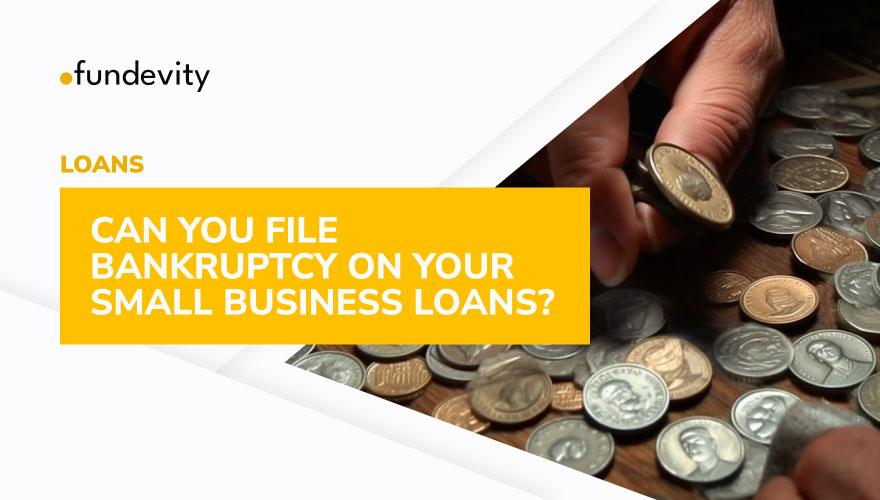Bankruptcy and SBA Loan Discharge

Are you considering filing for bankruptcy but you don’t know how it would affect your Small Business Administration (SBA) loans? You’re not alone. Many business owners are contemplating if their personal guarantee on an SBA loan could put them in a difficult financial situation if they file for bankruptcy.
Fortunately, there is some good news when it comes to discharging or eliminating debt from an SBA loan through Chapter 7 or Chapter 13 bankruptcies. In this article, we’ll discuss what happens to dischargeable debts under both types of filings. We’ll also go through other options available in case you decide against declaring bankruptcy altogether.
What Is An Unconditional Personal Guarantee On A Small Business Administration Loan?
Before we get into whether or not these loans can be discharged in Chapter 7 or 13 bankruptcy, let’s first look at the type of agreement that is existing between yourself and the lender. This is prior to taking out any funds through an SBA-backed program like those available from banks and credit unions alike.
This formality puts all parties involved into legally binding contracts whereby each party agrees upon specific terms and conditions regarding repayment obligations, etc. Thus making sure everyone understands who holds responsibility over payments made towards said funding source(s).
As part of this arrangement, one must also understand that failure on behalf of either side may result in legal action being taken. So make sure you read everything thoroughly before signing anything!
Can I File Bankruptcy On My Small Business Loans?
Yes, depending on your circumstances, you may be exempt from repaying some or all of your outstanding balance due after successfully completing either Chapter 7 liquidation proceedings OR reorganizing finances within 3-5 years using Chapter 13 protection plans.
The key here is to understand how much money you need to pay back versus the total assets you own. This is because only unsecured creditors, such as bank accounts with no collateral backing them up, are typically taken into account during court hearings.
How Does Filing For Bankruptcy Affect Your Credit Score And Future Lending Opportunities?
It should go without saying, but having gone down the path of seeking financial assistance means future lending opportunities are more limited than ever before. Especially given the fact that most companies now check applicant histories very closely.
It means that bad marks left behind following the successful completion of the bankruptcy process remain visible long after, regardless of the actual outcome itself. For instance, whether the borrower did manage to pay off the debt.
And, while scores do improve over time, it still takes considerable effort to rebuild reputation amongst potential lenders. Thus, you need to exercise caution when contemplating similar actions in the future. This is regardless of how current the state of affairs may appear momentarily!
What Are Other Options Available To Me If I Don’t Want To Declare Bankruptcy?
There are numerous alternatives to a full-fledged declaration to consider, including negotiating a payment plan or restructuring existing agreements. Consolidate multiple sources of income to reduce monthly repayments. Also, consider further refinancing options that will allow you to switch to lower interest rates. This will save you from cash flow issues.
Finally, selling property assets will raise your capital to cover the costs of a specific venture. Nevertheless, it is always worth exploring all options to get the best results at the end of the day.
Nobody wants to be in the same situation a few months later, unable to move forward and progress toward life goals set earlier simply because they didn’t have enough information to begin their journey properly.
Conclusion
It is clear that, while facing the reality of the possibility of declaring oneself insolvent is a daunting prospect, it is ultimately beneficial to do so. Of course, provided the correct steps are followed throughout the entire procedure, ensuring maximum benefit with the least disruption to daily routine activities.
Meanwhile, remember to seek professional advice when necessary to avoid costly mistakes occurring unnecessarily and otherwise regretting decisions.
FAQs
1. How long will it take before my debt is fully discharged after filing for bankruptcy?
Depending on the details of the case, it generally takes between 6 and 12 months until the paperwork is final. After that, you will be free of the burden.
2. Can all debts be included under the same declaration, or do they need separate filings made individually for each one?
There is no need to worry about separate applications, such as for student loans and mortgages. For car finance arrangements, it typically includes single documents for submission to the court.
3. Am I able to reapply for another type of funding once I have been granted relief from previous obligations?
Yes, though bear in mind that you would likely face higher borrowing fees and stricter criteria than normal applicants.


